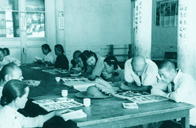|
 government
held examinations through which to select officials
and instituted such examinations into a system. The
imperial examination system became part of feudal bureaucracy
and gradually overrode school education. The imperial
examination system was different from the Western educational
system, under which knowledge is taught according to
branches of learning. Under the imperial examination
system, the content of teaching and examinations included
poetry, essays, Confucian classics, and comments on
strategies of governance advocated by past sages. The
purpose was to instill into students feudal orthodox
ideas such as royalty to the emperor and the duty to
defend traditional moral principles. During the Ming
(1368-1644) and Qing (1644-1911) periods, candidates
sitting at imperial examinations were required to write
essays strictly in accordance with government
held examinations through which to select officials
and instituted such examinations into a system. The
imperial examination system became part of feudal bureaucracy
and gradually overrode school education. The imperial
examination system was different from the Western educational
system, under which knowledge is taught according to
branches of learning. Under the imperial examination
system, the content of teaching and examinations included
poetry, essays, Confucian classics, and comments on
strategies of governance advocated by past sages. The
purpose was to instill into students feudal orthodox
ideas such as royalty to the emperor and the duty to
defend traditional moral principles. During the Ming
(1368-1644) and Qing (1644-1911) periods, candidates
sitting at imperial examinations were required to write
essays strictly in accordance with
|
|
a rigid eight-part form. Essays of this kind were known
for poverty of ideas. The imperial examination system
became a narrow bridge, through which the educated in
the feudal society acquired the benefits of a privileged
class. It resulted in a lopsided development of educated
people in China's feudal society. Along with progresses
in  science
and technology, school education in feudal China, while
dominated by Confucian teachings, began to cover math,
astrology and traditional medicine. The Tang period
(618-907) saw the establishment of a number of special
schools and official organs such as the Imperial Medical
Office, Office of Carriages and Horses and Office of
Astrology. Students were enrolled for different branches
of learning and became professionals. Such schools developed
to a considerable extent during the Tang-Song periods
(960-1279). But in the centrally- science
and technology, school education in feudal China, while
dominated by Confucian teachings, began to cover math,
astrology and traditional medicine. The Tang period
(618-907) saw the establishment of a number of special
schools and official organs such as the Imperial Medical
Office, Office of Carriages and Horses and Office of
Astrology. Students were enrolled for different branches
of learning and became professionals. Such schools developed
to a considerable extent during the Tang-Song periods
(960-1279). But in the centrally-
|